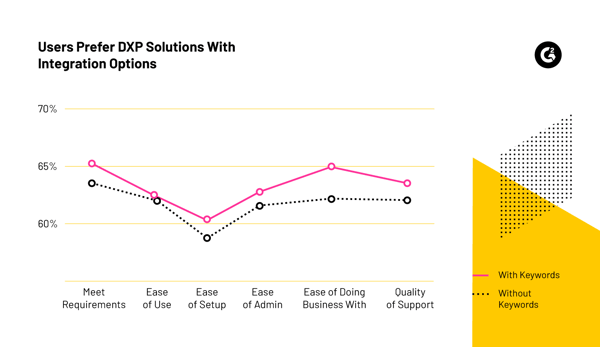This post is part of G2's 2024 technology trends series. Read more about G2’s perspective on digital transformation trends in an introduction from Chris Voce, VP, market research, and additional coverage on trends identified by G2’s analysts.
Integrations over consolidation in DXP solutions
Prediction
In 2024, digital experience platforms (DXP) will focus on expanding their range of third-party integrations rather than on consolidation.
Consolidation occurs to combine adjacent functionalities of multiple software products into one platform to improve customer experience and increase the value customers receive from using the platform. When it comes to DXP, consolidation doesn’t provide this outcome.
If players want to stay competitive and offer their customers the ability to create a customized solution, they must continue providing integrations with best-of-breed solutions.
The limitations of having one platform to do it all
A digital experience platform is, by definition, the combination of several software solutions that work in conjunction to create and deliver personalized digital experiences based on customer data.
That’s a lot of functionality. If we break this up into separate software, we would have a customer data platform, a customer analytics tool, a headless CMS, a digital asset management tool, a content creation tool, and a marketing automation platform. There are plenty more involved.
It would be extremely costly and difficult for one company to provide all of the technical elements in this solution. Companies that have tried to do this often dilute their focus and struggle with resource allocation.
With a lack of focus on one or a few software specialties, a company won’t succeed in creating a best-in-class product.
In the case of DXPs, the benefits a large integration ecosystem offers outweigh the inconvenience of managing multiple vendors.
Users satisfied with DXP solutions often prefer integration options
Among users of DXP software, those who mentioned having a positive experience with integrations generally rated products higher overall on multiple metrics, as shown in the graph below.

DXP reviewers who appreciate integration options mentioned how integrations have allowed them the flexibility to customize their DXP solutions to best fit their business needs. These reviewers (217 reviews) gave satisfaction metrics slightly higher scores than DXP reviewers (2,095 reviews) who did not speak about integrations.
The largest gap in the score is for the ‘Ease of Doing Business With’ metric, which may indicate user preference for dealing with vendors with a more narrow and focused functionality. These vendors are likely to have specialized knowledge of their particular domain and a deep understanding of their customers, which allows them to be better positioned to solve issues and provide support.
Some DXP providers and users will argue that traditional closed DXPs that offer all the components out-of-box are superior to composable DXPs because the complexity of integrating multiple systems can be avoided.
While setting up integrations is the biggest hurdle DXP users face, it will likely be worth the benefits integrations offer.
Composable DXPs allow for the agility to rapidly respond to changing technology and faster-changing customer needs. They also help users better manage costs by only investing in necessary tools.
Last but not least, they help bridge the gap between siloed customer experiences by allowing businesses to understand customers on their journey across multiple digital channels and present them with relevant, timely, and personalized content.
The future of digital experience platforms is flexibility
While other software solutions shift towards consolidating multiple functionalities onto one platform, DXPs will continue expanding their integration capabilities to offer users best-in-class third-party solutions.
This will allow for more customization, faster implementation, and excellent customer support.
Learn how to master your omnichannel retail strategy.
Edited by Jigmee Bhutia


 by Priya Patel
by Priya Patel
 by Priya Patel
by Priya Patel
 by Priya Patel
by Priya Patel